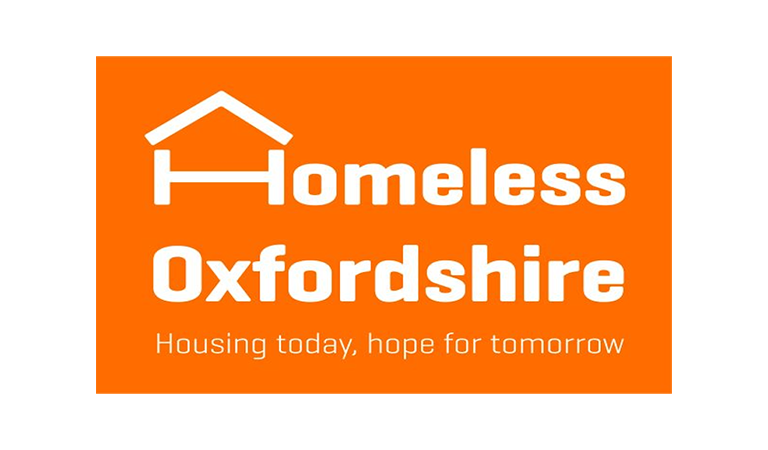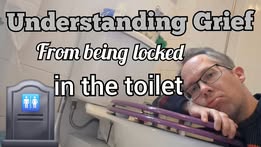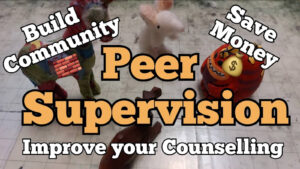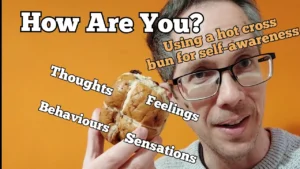10km run for Homeless Oxfordshire
This year marked ten years since I started with Homeless Oxfordshire (HOx) and to commemorate that I did a sponsored run called Wolf Run which involved running 10 kilometres through 30 obstacles including rivers, mud, tyres, and fences.
In the first half of this article I will reflect on thirty obstacles we support homeless clients to navigate so that they can move towards independence.
In the second half I wanted to spend some time reflecting on my years at HOx and the various services they provide.
The below image is from the Behind Their Eyes Arts Exhibition
All the pieces were made by clients using Homeless Oxfordshire’s services and here collage is used to express a client’s recovery from substances
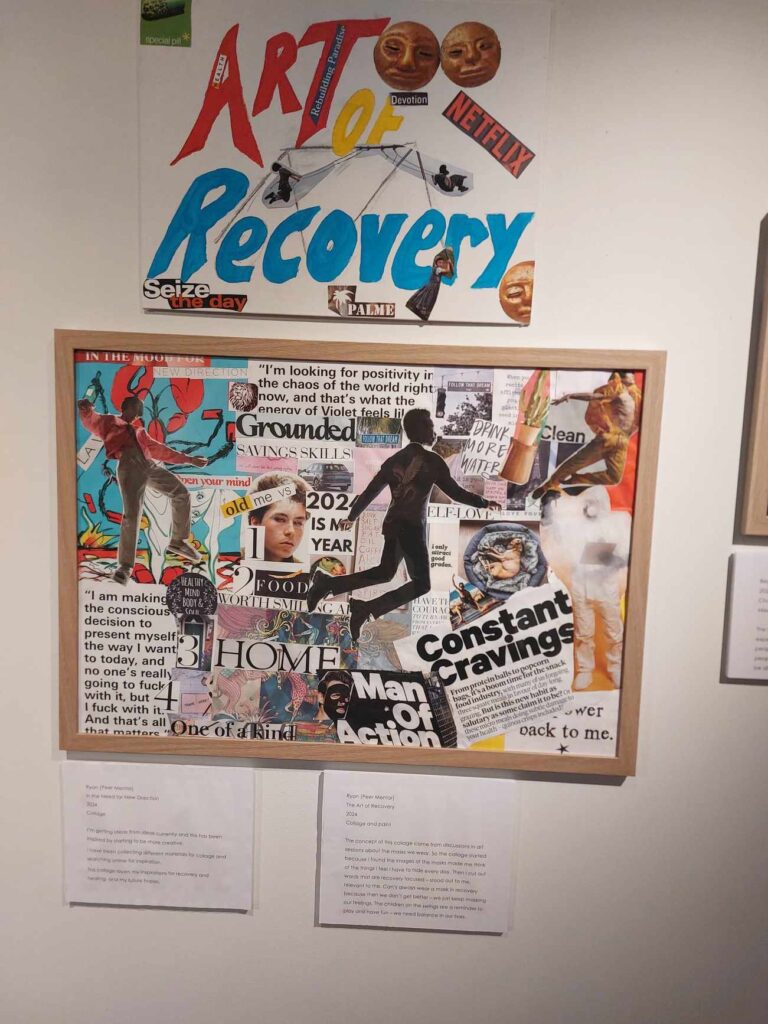
Obstacles Homeless People Face
Support is unique and tailored to each individual, but here is a list of thirty things we support clients with, just as I ran over thirty obstacles with Wolf Run:
1. Long Term Housing
Oxfordshire is incredibly expensive, and the private sector is saturated and difficult to afford rent with Local Housing Allowance. We also support clients to enter the General Housing Register in an area where they have support, but that too can be met with big waiting lists and has lengthy forms to reach it. Believe it or not, housing is not the main issue for homelessness, so although this is our goal for our clients, our main task is equipping clients with skills to manage their own housing so that they can move on sustainably.
2. Neurodivergences
Most people under forty are diagnosed with neurodivergences in school, but our clients have often had difficult, fractured upbringings or unequal access to education so may not have had the opportunity to see if their processing style is different. Please see my article if you are wondering if you have traits of autism.
3. Addiction
Addiction means a powerlessness to stop using a substance that we depend on physically and emotionally. This may be alcohol or drugs, but we can also find other things such as gambling, shopping, porn, or even exercise addictive. HOx works with clients and a variety of agencies such as Turning Point to support clients in their recovery.
4. Benefits
Setting up a Universal Credit (UC) claim needs computer literacy skills which not all our clients have, and often requires filling in intimidating forms such as the Work Capability Assessment to get the right amount of money to match their health needs. All Community Support workers are trained in benefits to help clients avoid falling into arrears, and support clients to be able to manage their own benefit claims until they are ready to return to work.
5. Qualifications
If we haven’t had equal access to education, have neurodivergences such as ADHD, or our processing style is not audio-visual, then traditional schooling methods can be exclusive alongside possible negative associations with school as a child (often a trauma filled time for our clients). We initially work with our clients to build soft-skills (e.g. learning how to use a smart phone) and brief courses (e.g. Ruskin College will be tailoring a course in Mental Health and Resilience for our residents in May) and then look to getting them more qualifications that match their interests and desires. For some clients, that may be a Peer Mentoring Level 2, for others that might be a CSCS Construction test, or a course on how to work a coffee machine with a view of becoming a barista.
6. Exercise
We work with the council and local gym to get gym passes, and our Activity Manager regularly puts on sports days to get our residents involved with looking after their physical health. One of the things that I enjoy seeing at Sapling is the clients going to the gym or long bike rides together. The average age of death of a rough sleeper is only 43, and factors such as healthy eating and exercise really help our clients to boost their longevity. There are also existential and health benefits to exercise (see this article on benefits of running).
The below picture is me after a run.
After exercise such as a run you can feel exhausted (no doubt I won’t look so good after Wolf Run), but also healthier in mind and body
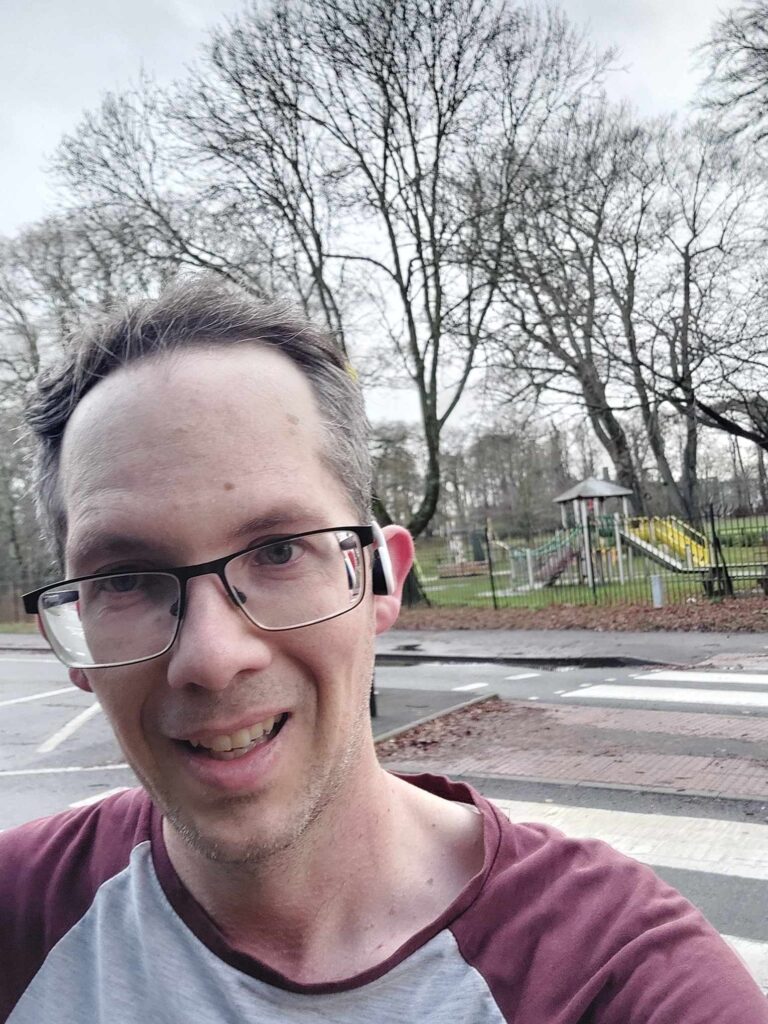
7. Counselling
Homeless clients have universally experienced trauma in their lives. All of our staff are trauma informed in their training, we have a clinical psychologist embedded into O’Hanlon House (OHH), and several staff (like me) have qualifications in counselling. We often apply for funding to support clients into specialist one-to-one confidential counselling to address some of the traumas that can make recovery so difficult.
8. Pets
Getting a place in Oxford that takes a dog can be tough, but I’ve known many a homeless person who would rather sleep on the street than lose their companion. We have several dog-beds, provide supplies for pet owners, and will register clients with charities like The Dog Trust to ensure that their pooch’s veterinary needs are met.
9. Offending
We work closely with probation services if a client has an offending history to support them out of offending. We work in a strength-focused way as punishment doesn’t rehabilitate, to build their recovery capital and hope for an alternate life. Without the work of homeless charities, homeless people would be likely to relapse into offending/substances/hospitals whereas we support clients towards independence.
10. Hoarding
We provide regular health and safety checks in rooms to check for fire-risks and to support clients to manage a tenancy. Hoarding is a complex issue, often linked to trauma and psychological issues that isn’t as easy as ‘clear your room’. We clean with clients, refer for specialist support, and guide them in their self-care of their room.
11. English Language
We take clients with English as a Second Language (ESL) and clients who are refugees or need support around their right to remain. In a sense, our workers work with every client to find the right language to connect with them, but cultural and language awareness are important when working with clients with ESL.
12. Connecting with Family
One of the most joyous things about Sapling is seeing clients who are estranged from their family, such as parents or children, and watching as the family begin to trust them again as they progress with their recovery. We safeguard children whilst supporting clients to learn about parenting and relationships, and in so doing we often see clients reunited with their family.
13. Assertiveness and Conflict
We signpost towards assertiveness training and help clients to give feedback and complaints in a way that is assertive rather than aggressive or conflicting. In Sapling particularly, managing conflict and difficulties within the group space is formative to building healthy relationships and empowering our clients to express themselves when they are affected by others (including me).
14. Sleep Hygiene
This was one of the first psycho-educational groups I ran at Sapling. Often, when clients are coming off substances, they will experience nightmares and it can take over a year to return to a stable sleeping routine. We support with things such as encouraging a consistent sleep schedule, having a structure for the day and a reason to get up in the morning, moving away from dependence on substances to sleep, and providing safety compared to the alertness one needs when we are sleeping in a place that is unsafe such as the streets.
The below image is from the Guildford Spike and is what homeless sheters looked like 100 years ago. Fortunately our beds and properties with Homeless Oxfordshire are warm and comfortable, but clients still need support with their sleep hygeine
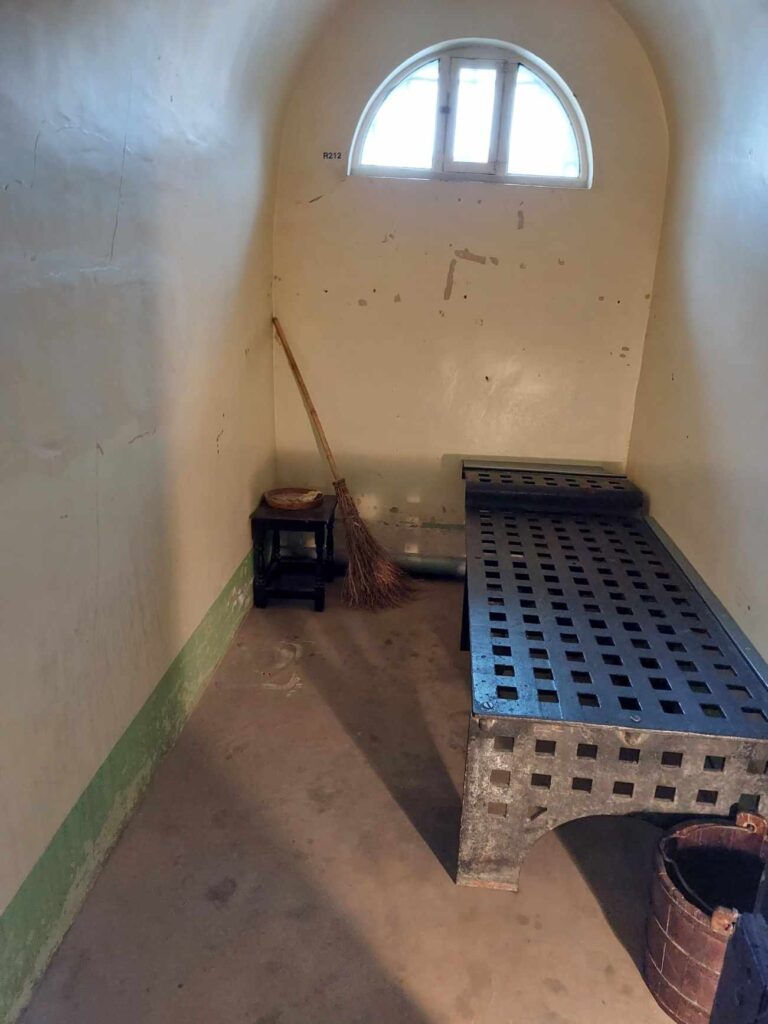
15. Maths and English
Often our clients haven’t had equal access to education. We will complete forms with them, but also get them onto a free Level 2 course in Maths and English (the equivalent of a GCSE) which is often needed for higher levels of study or for employment in many positions.
16. Friendships and Befriending
Many clients describe themselves as not having friends but ‘associates’ and it can be lonely leaving the homeless community. We support clients with community, befriending services, volunteering, and opportunities to integrate into community with friends they can trust and that are not a risk to them.
17. Suicide
We risk assess clients to work with them around suicide. We are trained in first aid, so if there is an incident or accidental overdose we can save lives. We work with a client to see that the need/reason behind their suicidal ideation or attempts is met and provide emotional support and counselling to give them hope a way out.
18. Debt
Debt follows you, and when you are on less than £400 a month, it can be impossible to put a dent in it. We signpost our clients to free, qualified debt advisors such as with CAP or Step Change, so debt stops holding them back. We also support clients with budgeting advice, and managing a small service charge so we can evidence to future housing providers that they can manage their bills before moving in.
19. Aging
We know specialist services for clients over the age of 55 and work well with other charities with a specialism in supporting people who are retired, such as Anchor Housing. We can also support people psychologically with transitions in their health and adapting existentially to change. We have supported clients with ‘End of Life Care’ and move on, to ensure that they die with dignity and in their own place.
20. Cultural Support
We respect our clients’ cultural heritage of faiths, country, and their individual communities. One of my favourite moments working in activity co-ordination was when it was Ramadan (like it is now) – I got in touch with a local Imam for a Muslim client who had disengaged with the mosque due to shame around their alcohol dependence. We visited together and it began a process of them reconnecting with their cultural heritage. We used to also do things such as cultural days e.g. where our Eastern European clients made some amazing food and talked about their culture to other clients to boost their integration.
21. Work
We support clients to try several different volunteering opportunities and meaningful uses of time. This enables them to get a sense of the direction they would like to head in for work, then we look at what skills/training/experience they would need to get into that industry – often contacting small businesses to see if there are apprenticeship opportunities. We will link clients in with specialist employment support with St Mungo’s to bolster their CV and practice interview questions. The majority of clients we support at Sapling move on to working full-time after they have moved on.
22. Health Issues
We will help clients to book health appointments, register with their GP, go with them to hospitals, talk with them about their medication, raise Care Assessments if their health needs are more than they can manage, and have a specialist Step-Down service that focusses on housing for clients who are homeless and being discharged from hospital. When on the street, time keeping and appointments can be difficult to manage, and the trauma of rough sleeping carries numerous risks to physical health. They, therefore, often need us to work around their health when they come in.
23. LGBTQ+
We support clients to be their true selves and find support and community around their sexuality and gender identity. Homelessness disproportionately affects any marginalised group and our clients have often endured traumatic childhoods or bullying in school that can make it difficult for them to feel safe to express their identity. We also provide sexual health support and products within OHH to support our clients to practice safe sex.
24. Hygiene
We provide clothing at OHH and signpost towards a place they can get clean clothing. We also work with the Food Bank and Hygiene Bank to provide clients with cleaning products for their body, clothing, and property. Many of our properties will have cleaners that support clients to manage their property, and other projects like Sapling have a cleaning rota and supply cleaning supplies. Some clients have sensory sensitivities that mean they are unaware of hygiene issues, or carrying around your belongings without a place to store it can make self-care difficult. We have those difficult conversations in a way that is compassionate and supportive and will support clients with their care-needs such as helping people to bathe at OHH.
25. Mental Health Issues
All our staff are trained in Mental Health First Aid to recognise the symptoms of when a client is suffering with their mental health. Depression and anxiety are almost ubiquitous to clients who rough sleep, as is trauma that contributes to behavioural issues. We practice positive behavioural support planning and undergo regular reflective practice as support workers to understand the motivations behind a client’s behaviour and what their behaviour communicates. We work with local GPs or CPNs, and source mental health support such as counselling for our clients. We understand that no two people are alike – just as anxiety is expressed differently in everyone.
26. Abuse and Exploitation
Our clients are vulnerable to abuse such as forced work, violence, sexual abuse, and cuckooing. We work closely with the police, the local neighbourhood team, and the council’s safeguarding professionals to keep our clients safe. We undergo regular training to be aware of the signs and symptoms of abuse and learn to speak with our clients compassionately to help them get support and protection.
27. Women’s Services
We have a specialist Women’s Project aimed at focussing on women and homelessness and recognising their experience and the different traumas they are likely to have faced. We support clients to protect them from abuse within relationships and provide psycho-educational workshops on relationship advice and conflict. We support clients with their children and access, if they are pregnant, and provide sanitary products from the Hygiene Bank.
28. Volunteering
We believe that giving our clients a structure of regular activity helps their motivation, self-esteem, confidence, and overall employability. We support various intensities of activity and volunteering which often progress into more senior roles and employment opportunities. I am proud to work with an organisation where half our staff have lived experience, and we have recently started our own Peer Mentoring scheme run by John Sugden to equip clients to volunteer with Homeless Oxfordshire in a way that is meaningful to them.
The below photos are from an activity we did as a house with Sapling playing football golf.
The clients are busy working on the recovery, volunteering, and training and trips help build community and support within the project.
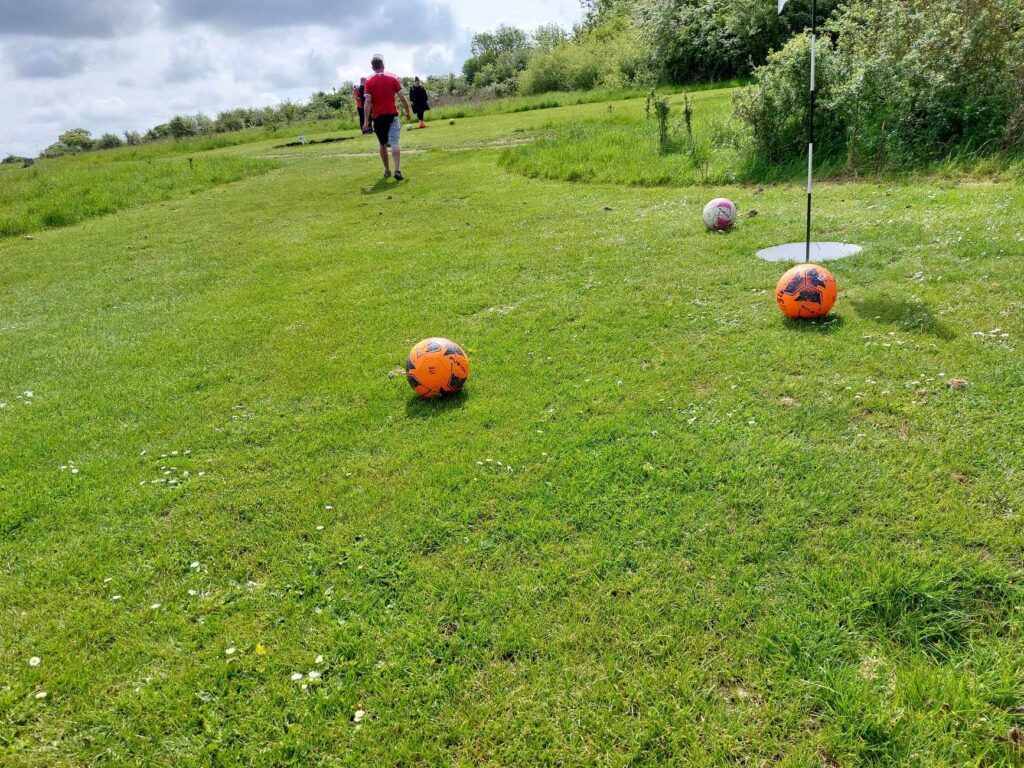
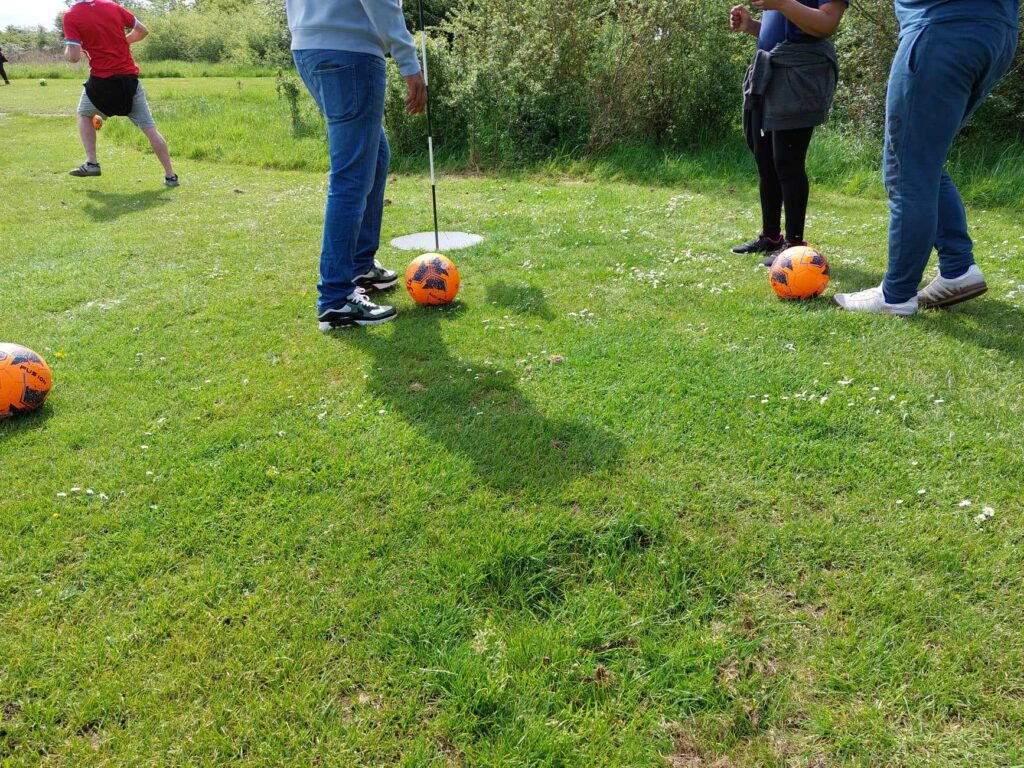
29. Managing Strong Emotions
We support our clients to communicate their needs and feelings clearly and safely for them and others. We support them after an incident to understand the needs they were trying to meet, and other ways to communicate those needs. We understand that when we stop using substances that emotions return, and that can be intense and risk relapse. We provide process groups for clients to share their feelings in a safe, structured environment. We provide counselling to help equip clients to self-regulate. We work closely with our partner organisations to help clients get support relevant to their mental health needs.
30. Significant Life Events
We support clients to recognise significant life events such as bereavements, celebrations of their clean-date, or transitions such as aging another decade. We understand that change can be overwhelming and support clients to cope with transitions or to tolerate significant life events without losing their progress. We provide counselling and support to help clients gain insight around their trauma and life-events to build resilience for when they come up.
10 Years With Homeless Oxfordshire
2014 – 2016: O’Hanlon House
I began my work in homelessness/the homeless sector at O’Hanlon House (OHH) which is a day and night shelter based in the centre of Oxford. Back then, over fifty people would sleep there each night, and more would come to use services such as the washing machines, showers, meals, and support we provided. My role was a “Project Worker” which was a varied exciting role blending client support, cleaning, practical help in OHH, and keeping the clients safe. OHH was the first port of call for clients when they are found sleeping rough in the streets of Oxford, trying to find them accommodation appropriate to their support needs.
I had spent two years volunteering with Edge Housing before this. Homeless Oxfordshire (HOx) continue working with other accommodation and support agencies across the county.
2016-2018: Step-Up Activity Co-Ordinator
I continued working with OHH but changed role to their Step-Up Program – initially blending this with helping the client support team by taking clients to appointments, and then eventually to co-ordinating the Step-Up program. The role was about engaging clients in activities and classes to build up their meaningful uses of time, qualifications, and self-beliefs. I would facilitate some of the activities myself, and others were run by our passionate volunteers. My personal favourite activity was Dog Walking – where we’d get an hour’s bus to the local animal sanctuary and then walk dogs together. It provided an opportunity for real conversation and connection in a different environment to support-planning in an office. Some other activities we provided include: cooking classes, yoga, art classes, gym visits, crafts, first aid training, music sessions, CSCS Card training for clients looking to work in construction, cultural days, resident forums, remembrances for people who had died, bereavement counselling with Cruse, IT classes, day trips, and we even made a radio podcast. A real aim of mine was to see if the clients could facilitate the activities themselves with our support.
I went part time as I began my counselling training, and later worked with Cruse Bereavement Care offering support for people after a bereavement, as well as committee work.
2018-2019: Employment Support
I left the OHH hostel and moved out to work in our Community Projects. HOx have many different community projects which are usually in shared housing (often with self-contained rooms) across the county. The community projects usually have a specialism to them so that the clients can be supported with their individual support needs. Our current 2024 community projects include: Sapling, Project 41, Vineyard (in Abingdon), Housing First, the Women’s Project, The Pre-Recovery Project, Step-up and Step-Down Housing, and we have some projects in Cherwell.
In 2018, the project I moved onto was called Reconnect. Reconnect’s focus was on supporting clients back into employment and was for clients who were near the end of their journey with us. To help them, we had a reduced rent so they could save up for a deposit on private housing and we partnered with small businesses to offer apprenticeship schemes to previously homeless people to build up their CVs. Many of the then Reconnect clients are still living independently and sustaining employment in places such as libraries, restaurants, and within the Homeless Sector as support workers. Helping our clients into meaningful uses of time, volunteering, building qualifications, and eventually employment is still a major focus of our projects at HOx.
I completed my counselling training during this time and moved down to two days a week (which I still am to this day with my private counselling practice).
2019-Now: Recovery, Group, and Move-On
I started working with Sapling. Sapling is part of community housing for clients who have come from rehab for substance misuse issues and are now totally abstinent from substances (which we test for as it is a substance-free [dry] house and therapeutic community). Group work is integrated into our program at Sapling, running groups that psycho-educate our clients on recovery and preparation for move-on. We also run process groups for clients to reflect on what is happening in their lives, share difficulties with their peers, and process feelings that can be intense and contribute towards lapses. The Sapling Project has therapeutic duties like cleaning built into the program, and an expectation that clients are busy outside of groups – volunteering and training in preparation for moving on to their own social housing. We support and fund clients’ move-on, run weekly cooking classes, have regular guest speakers at the project, and are planning a day trip this quarter to the beech or to watch Oxford United play.
I finished counselling training, continued volunteering with counselling charities like TLC and Hope, and opened my own private practice as a counsellor which I love doing alongside my work with Sapling – the two complement each other well.
The Covid pandemic hit during this time which very much changed the way we work, but HOx workers continued front-line visits every day, and we were very thankful when we could return to running groups without masks and temperature gauges.
In August 2023, I got into running – firstly doing the Couch to 5k (read my article on the journey) and now I am training for a half-marathon and am braving Wolf Run on the 27th April. My aim is to raise £400 – £10/km and £10/obstacle.
Conclusions
So this is my reflection of ten years with Homeless Oxfordshire, and examples of thirty obstacles homeless people might face before they can move on. Some of those issues, such as debt or housing, we may completely solve; others such as traumas from childhood or health issues can be ongoing needs but we equip clients to get support with it.
Please do sponsor me for Spring Wolf in aid of HOx
You can also donate to Homeless Oxfordshire directly, volunteer, and find out more about what we do on our website.
Finally, please visit my website if you are looking for counselling, or you can follow me on Facebook or Strava, and contact me on [email protected].
Simon is a Person-Centred Counsellor in Oxford working remotely and in person, as well as working for Homeless Oxfordshire’s Sapling Project. He also enjoys running and will be running 10k in April to raise money for HOx.

